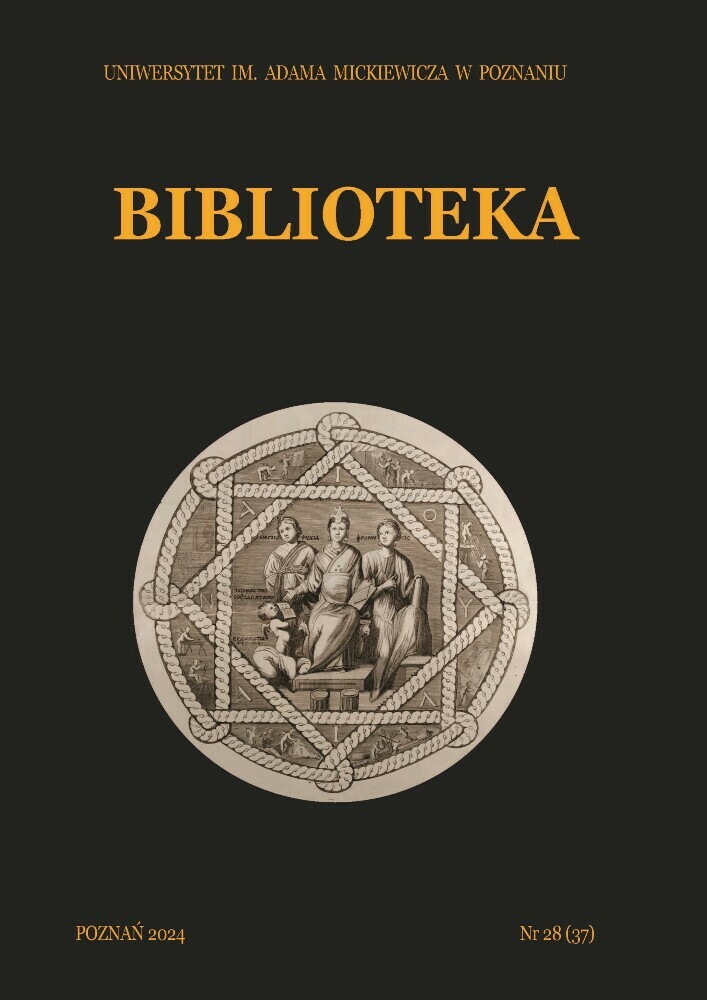Abstract
Union catalogues are the norm in developed countries. In the most widespread model, metadata resources grow with the growth of collections, through shared cataloguing. The aim of this article is to give a general overview of the tasks and directions of development of union catalogues, with a particular focus on new technologies, and in the context of the complexity of managing projects involving the implementation of their new kinds. We also warn against defective solutions. Conclusions were derived from the authors’ own observations and those mediated by the literature; methods therefore can qualify as empirical and meta-empirical. The focus was on „national” (country) union (central) catalogues. Examples of several solutions were given, subjecting them to evaluation, formulated mainly in terms of user experience and cultural priorities of design. The changes that catalogues undergo when using Linked Open Data are considered and progress to date is critically assessed. A comparison is also made between the NUKAT union catalogue of Poland, founded in 2002 and dominated by the resources of academic libraries, and the (competing?) „integrated catalogues” project run by the National Library. Successful projects, such as the new British or Swiss catalogue, also based on the Software as a Service principle, have an advantage over others not so much due to the inclusion of linked open data, but due to the harmonious cooperation of many institutions. We conclude that its implementation in Polish managerial practice is crucial to the success of the target Polish catalogue.
References
Bibliotekarstwo, red. A. Tokarska, Warszawa: Wydawnictwo SBP 2013.
ExLibris [artykuł sponsorowany], Queensland Health Libraries Network. Bringing it all together, „Journal of Health Information and Libraries Australasia” 2022, t. 3 (1), s. 36–38. DOI: https://doi.org/10.55999/johila.v3i1.105
Feret B., Are our union catalogs satisfying user’s needs, w: Union catalogs at the cros s - road, red. A. Lass, R.E. Quandt, Hamburg: Hamburg University Press 2004, s. 227–244. DOI: https://doi.org/10.15460/hup.228.1682
Franke J., Projekt OMNIS Biblioteki Narodowej, Warszawa 2024, Repozytorium Instytucjonalne Uniwersytetu Warszawskiego, 2024, https://repozytorium.uw.edu.pl/bitstreams/f911619a-12ae-44f7-9d86-66a40a4a66f1/download [dostęp: 17.07.2024].
Hyvönen N., The Finnish National Union Catalogue [arkusz zawierający streszczenie wystąpienia, ELAG 2010, Helsinki], https://indico.cern.ch/event/75915/contributions/1248030/contribution.pdf/ [dostęp: 8.06.2024].
Holländer S., Przyszłość akademickich systemów bibliotecznych, czyli użytkownik jeszcze bardziej w centrum uwagi, przeł. H. Hollender, „Biuletyn EBIB” 2022, nr 5 (206), http://ebibojs.pl/index.php/ebib/article/view/827 [dostęp: 15.07.2024].
Hollender H., Rozwiązania światowe w zakresie platform informacyjnych, w: Rozwiązania organizacyjne zapewniające trwałość systemom informacji naukowo-technicznej, red. J. Kisielnicki, M. Gałązka-Sobotka, Warszawa: Uczelnia Łazarskiego 2012, s. 60–76.
Hollender H., Union catalogs for poets, w: Union catalogs at the crossroad, red. A. Lass, R.E. Quandt, Hamburg: Hamburg University Press 2004, s. 245–264. DOI: https://doi.org/10.15460/hup.228.1683
Mykowiecka A., Inżynieria lingwistyczna. Komputerowe przetwarzanie danych w języku naturalnym, Warszawa: Wydawnictwo PIATK 2007.
Nahotko M., Czy (centralne) katalogi biblioteczne są jeszcze potrzebne? OPAC w infotopii, „Acta Universitatis Lodziensis. Folia Librorum” 2019, nr 2, s. 43–59. DOI: https://doi.org/10.18778/0860-7435.29.03
Orliński W., Internet. Czas się bać, Warszawa: Agora 2013.
Palmer J., Williams C., Walk P., Kay D., Rehberger D., Hart-Davidson B., Digital Libraries, Personalisation, and Network Effects-Unpicking the Paradoxes, „Research and Advanced Technology for Digital Libraries” 2009: 13th European Conference, ECDL 2009, Corfu, Greece, September 27-October 2, 2009. Proceedings 13.
Paluszkiewicz A., Padziński A., Aiming at the union catalog of Polish libraries, w: Union catalogs at the crossroad, red. A. Lass, R.E. Quandt, Hamburg: Hamburg University Press 2004, s. 265–280. DOI: https://doi.org/10.15460/hup.228.1684
Praxishandbuch Wissenschaftliche Bibliothekar:innen, red. W. Sühl-Strohmenger, I. Tappenbeck, Berlin–Boston: De Gruyter Saur 2024.
Quandt R.E., The changing landscape in Eastern Europe. A personal perspective on philanthropy and technology transfer, New York: Oxford University Press 2002. DOI: https://doi.org/10.1093/oso/9780195146691.001.0001
Radwański A., System biblioteczny jako powszechna usługa sieciowa i baza danych, w: Systemy biblioteczne nowej generacji. Platformy usług, red. M. Odlanicka- -Poczobutt, Gliwice: Biblioteka Główna Politechniki Śląskiej 2015, s. 31–38, https://delibra.bg.polsl.pl/Content/35893/Radwanski.pdf [dostęp: 15.07.2024].
Sanetra K., Format MARC 21 rekordu bibliograficznego dla rękopisu, Warszawa: Biblioteka Uniwersytecka w Warszawie 2019, https://centrum.nukat.edu.pl/images/files/instrukcje_procedury/MARC_21/marc21_rekopisy_20191023.pdf [dostęp: 1.06.2024].
Unterstrasser J., Linked Data and Libraries. How the Switch to Linked Data Has Affected Work Practices at the National Library of Sweden, Master’s thesis, Department of ALM, Theses within Digital Humanities, Uppsala: University of Uppsala 2023, https://uu.diva-portal.org/smash/get/diva2:1773893/FULLTEXT01. pdf/ [dostęp: 2.04.2024].
Wennerlund B., Barggren A., Leaving Comfort Behind. A National Union Catalogue Transition to Linked Data, w: IFLA WLIC Athens 2019, Satellite Meeting: Data intelligence in libraries: the actual and artificial perspectives, 22–23 August 2019, Location: Deutsche Nationalbibliothek, Frankfurt, Germany, https://library.ifla.org/id/eprint/2745/1/s15-2019-wennerlund-en.pdf/ [dostęp: 2.04.2024].
Wolniewicz T., Implementing KaRo. The distributed catalog of Polish libraries, w: Union catalogs at the crossroad, red. A. Lass, R.E. Quandt, Hamburg: Hamburg University Press 2004, s. 281–296. DOI: https://doi.org/10.15460/hup.228.1685
Zakrzewski Z., BIBFRAME. Linked Data w bibliotece, czyli co każdy bibliotekarz wiedzieć niekoniecznie powinien, Warszawa 2020, https://docs.google.com/document/d/1212u6NVnZpgfXVbpIVSE8ULUp_1UAEpsCS5ibFQhk_w/edit [dostęp: 26.06.2024].
License
Copyright (c) 2024 Henryk Hollender

This work is licensed under a Creative Commons Attribution-ShareAlike 4.0 International License.
Utwory opublikowane w czasopiśmie Biblioteka, na platformie Pressto należącej do Uniwersytetu im. Adama Mickiewicza w Poznaniu od 2015 roku są udostępniane na
licencji Creative Commons Uznanie autorstwa-Na tych samych warunkach 4.0 Międzynarodowe.
Tym samym wszyscy zainteresowani są uprawnieni do korzystania z utworów opublikowanych po 2015 roku pod następującymi warunkami:
- uznania autorstwa czyli obowiązek podania wraz z rozpowszechnianym utworem informacji o autorstwie, tytule, źródle (odnośniki do oryginalnego utworu, doi) oraz samej licencji
- na tych samych warunkach — remiksując utwór, przetwarzając go lub tworząc na jego podstawie, należy swoje dzieło rozpowszechniać na tej samej licencji, co oryginał.
Uniwersytet im. Adama Mickiewicza w Poznaniu zachowuje prawo do czasopisma jako całości (układ, forma graficzna, tytuł, projekt okładki, logo itp.).
Autor zachowuje prawa majątkowe, ale udziela zgody Uniwersytetowi im. Adama Mickiewicza w Poznaniu na wykorzystanie dzieła. Autorzy tekstów zakwalifikowanych do publikacji proszeni są o wypełnienie podpisanie i przesłanie umowy.
Jeżeli autor artykułu nie jest przekonany, że może wykorzystywać cudze utwory (np. ilustracje, fotografie, tabele) w ramach cytatu we własnej tekście musi dostarczyć do redakcji czasopisma zgodę od uprawnionych podmiotów.
Prawa są zastrzeżone do wszystkich tekstów opublikowanych przed rokiem 2015.






